|
SEO updates you need to know
Sponsor: Enfra
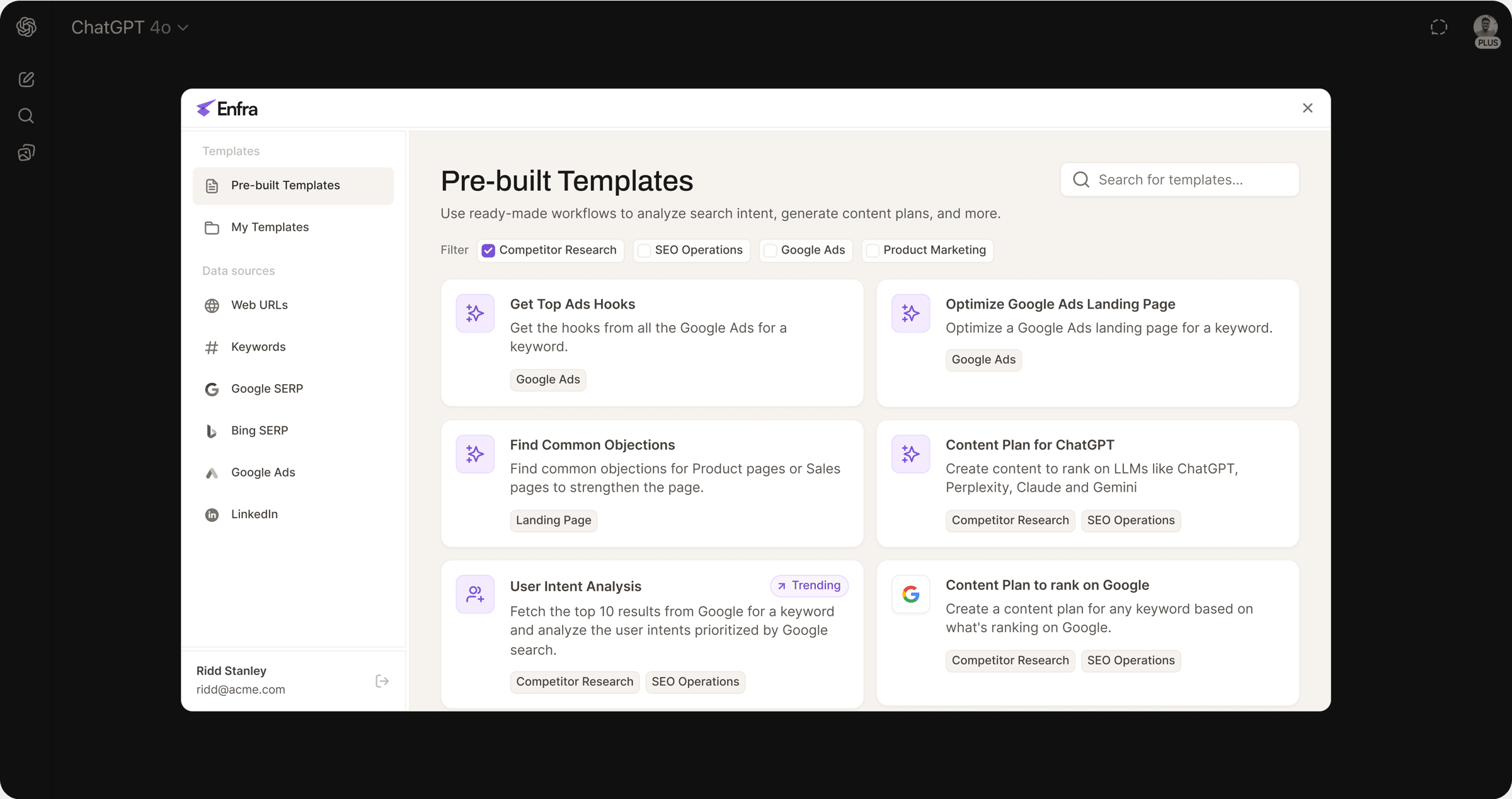
Thousands of SEOs use Enfra to save hours every week.
Instead of manually checking SERPs, comparing competitors, and building briefs - Enfra helps you do that in ChatGPT.
✅ Compare your content with the top 10 ranking pages and find optimization opportunities
✅ Build content briefs and meta tags based on the top ranking results in seconds
✅ Analyze your content's schema, and “People Also Ask” gaps
✅ Analyze your GSC data in ChatGPT to discover keywords with high impressions but low clicks
And much more!
No API keys. No setup. Just install in Chrome and go.
|
Search with Candour podcast
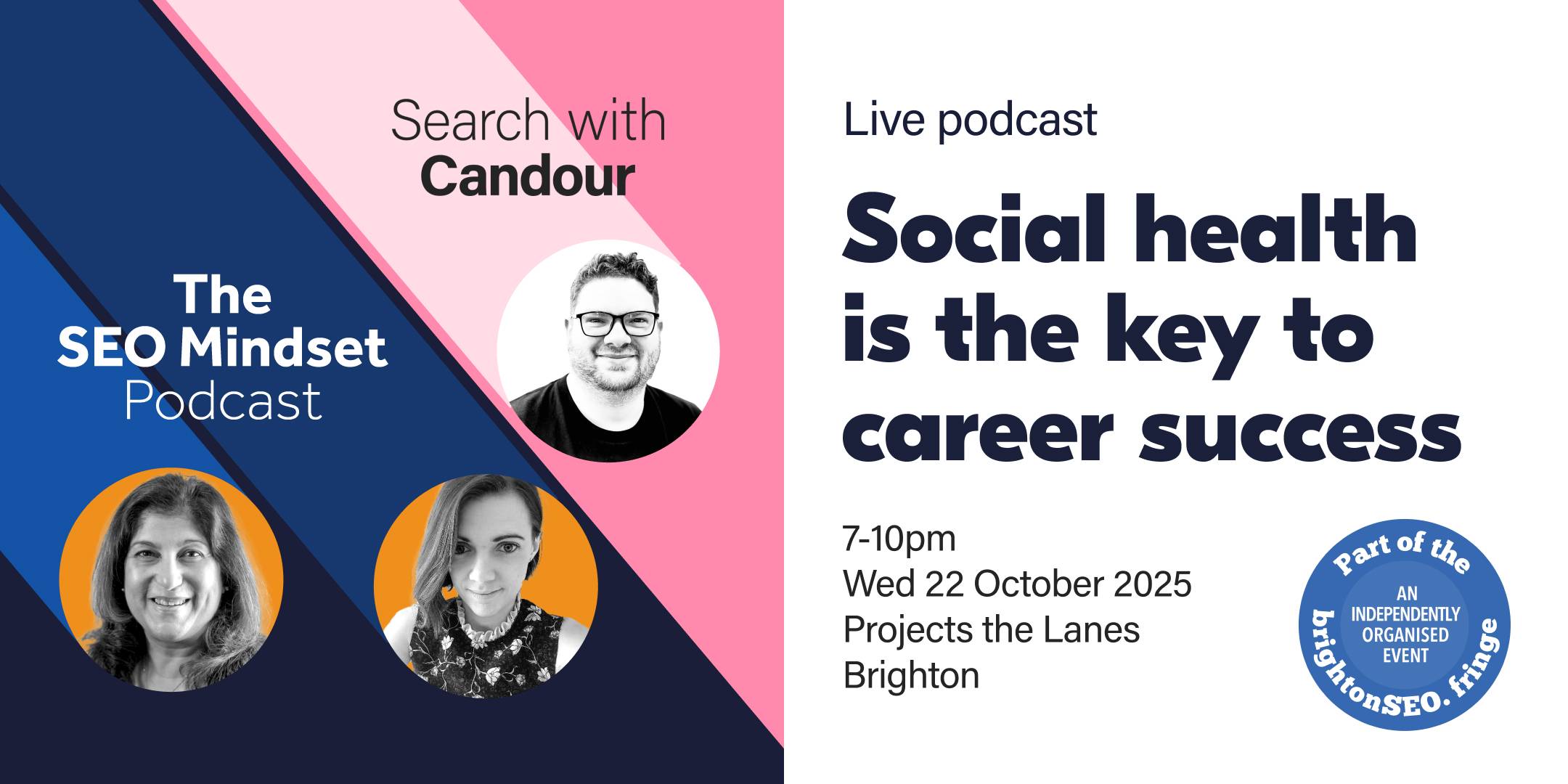
Social health is the key to career success
Season 4: Episode 42
Join us LIVE from Brighton as the teams from SEO Mindset and Search with Candour come together for an engaging and informative podcast.
In this special episode, the three hosts dive into under-discussed topics in the SEO industry, focusing on mental well-being, soft skills, and social health.
The topic in focus in this episode is the importance of intentional social connections for career progression, and practical tips on maintaining good social health.
The episode also features insights from the audience, real-life stories, and a detailed analysis of Google's take on 'social health.'
|
|
|
This week's solicited tips:
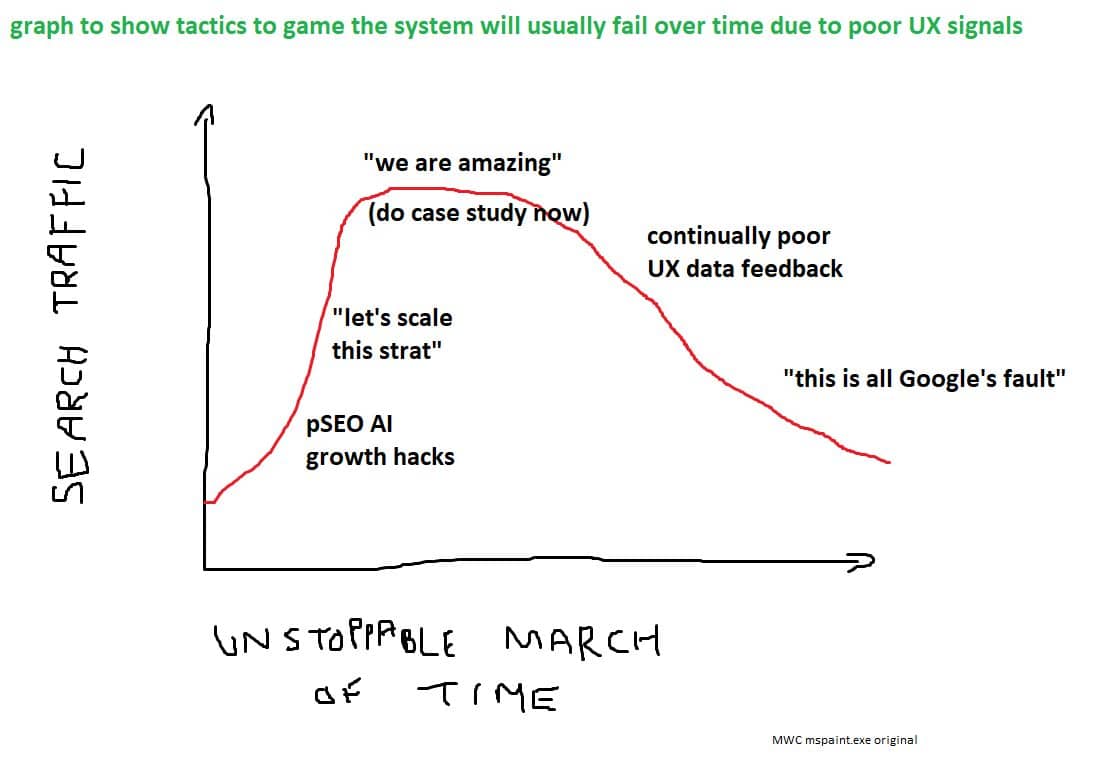
Today is a good day to die
It's actually pretty easy to get a lot of organic traffic and rankings fairly quickly with some scalable tactics, but I'm a rarely interested in them because the "live or die" comes down to....
User signals 🖱️
We've known this for a long while, and I remember having chats at TIO Bulgaria with Arnout Hellemans talking about Google updates, new rankings and things "settling" as new user data comes in and it is something I see *frequently* now.
AI has made lots of the (very old!) pSEO-type tactics, which before had a technical barrier of entry more common.
So many traffic graphs so booming growth as content, pages, sections, are churned out. Then you get the amazing case study, and nobody talks about the next couple of years when the sites traffic bleeds out.
"But it was worth it, because of all that traffic and revenue!" is something I hear at this stage, but let's consider:
- The reason those signals are bad is because you've given users bad experiences. This is going to rot your brand overtime, and SEO aside, that is a hard thing to come back from.
- A good way to think about your reputation in Google is a "rolling average", which is why SEO takes time. You've just given yourself low scores, month on month. Even if you bin everything and start over, you've dug yourself an expensive hole to get out of.
|
Prompt tracking is futile
I am sure this will be hugely unpopular with a lot of people; but I think AI prompt visibility tracking is generally a big and expensive waste of time. 🤷♂️
The SEO industry has lazily tried to apply the 'old' paradigm of 'rank tracking' to LLMs, and frankly, it doesn't work well because it doesn't reflect how LLMs operate.
Traditional search engines rank documents in a linear order based on their perceived relevance to a query, LLMs contextually and non-deterministically generate an answer in language, not rankings.
Some search professionals herald the dawn of conversational AI because humans can interact with 'real' language instead of queries; yet still want to try and measure results with the former, rather than the latter.
My thoughts have been shaped by discussions with Myriam Jessier on this, but I believe Dixon Jones is heading in the right direction with Waikay; it's more important to get an understanding of how the model perceives your brand, your product, your service. Does it understand what you're about? Who you serve? Why to choose your products?
The evolution is going in this direction:
1980s: Brand is what you tell people with billboards, TV ads, and writing things in the sky with planes
2000s: Brand becomes what people collectively say about you, as they themselves become hyper-connected on the web
Now: Brand will become what AI understands about you, as we build tools that are capable of reading huge swathes of the internet and summarising opinion, features, and experience.
It makes no sense to try and explore the latter by bombarding it with prompts; using a handful as a 'dipstick' to see where you are might be interesting, but this should not be the focus.
Contextual, qualitative interrogation of models to understand the 'shape' of your brand within them, and if that matches up with your aspirations is the way forward.
|
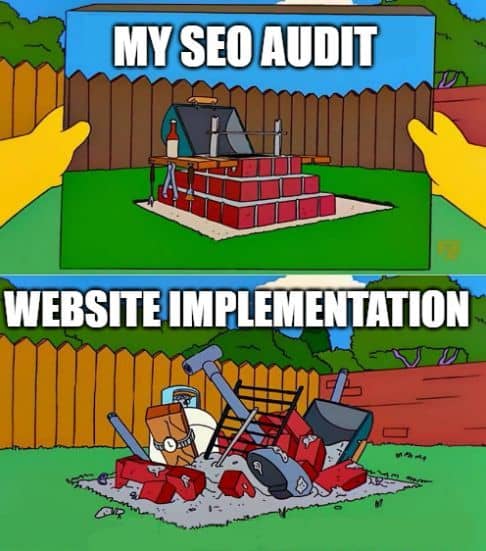
Tool. Site audit. Hot.
Even if you've done a wonderful job on your SEO audit, it will have no business impact unless it is implemented correctly, so let's talk about some of that process ⤵️
🏁 Validation: Is the process you go through with the client on the issues you have identified to figure out:
- "Do we even care about this?": I've completed audits where I've found issues in sections of the site, only to be told the client that part of the business wasn't a priority for them. There is no point trying to force change where it isn't wanted!
- "How difficult is this?": Usually a discussion with the devs about the realities of their current systems, priorities, tech debt, and resource. I've been surprised that relatively simply changes have sometimes proved almost impossible, and othertimes significant changes could be made quickly. You can't give a final prioritisation of tasks when you don't know the true cost of implementation.
✅ QA: Regardless of documentation you provide, meetings you have, emails you send, you should check the changes (ideally before they go live). I've caught hundreds of fixes that have introduced other (sometimes worse) issues, or solutions that to be very blunt, someone hasn't understood and is trying to blag. It's not a great look trying to backtrack on things on live, have a process to check. Apart from investigating individual fixes, nne of Sitebulb's features is it can automatically compare to the last run audit, so you can quickly get an overview of how issues tracked there are being resolved on larger sites.
👀 Monitoring: You're here because SEO mistakes were made, and it will happen again. Sites change, things get broken, people that haven't been upskilled will make the same mistakes, new people make new ones. You can't do your audit and then walk off into the sunset. You need a system to flag this Systems like ContentKing (acquired by Conductor) when even small things like page titles have changed. Sitebulb also has a cloud version now that we use at Candour to periodically check in on sites.
Finally, for transparency, neither Sitebulb and ContentKing (acquired by Conductor) paid me for this post, I am a customer and pay both of them 😅
All of the above is also why technical SEO doesn't usually get done in "a few days" 😉
|
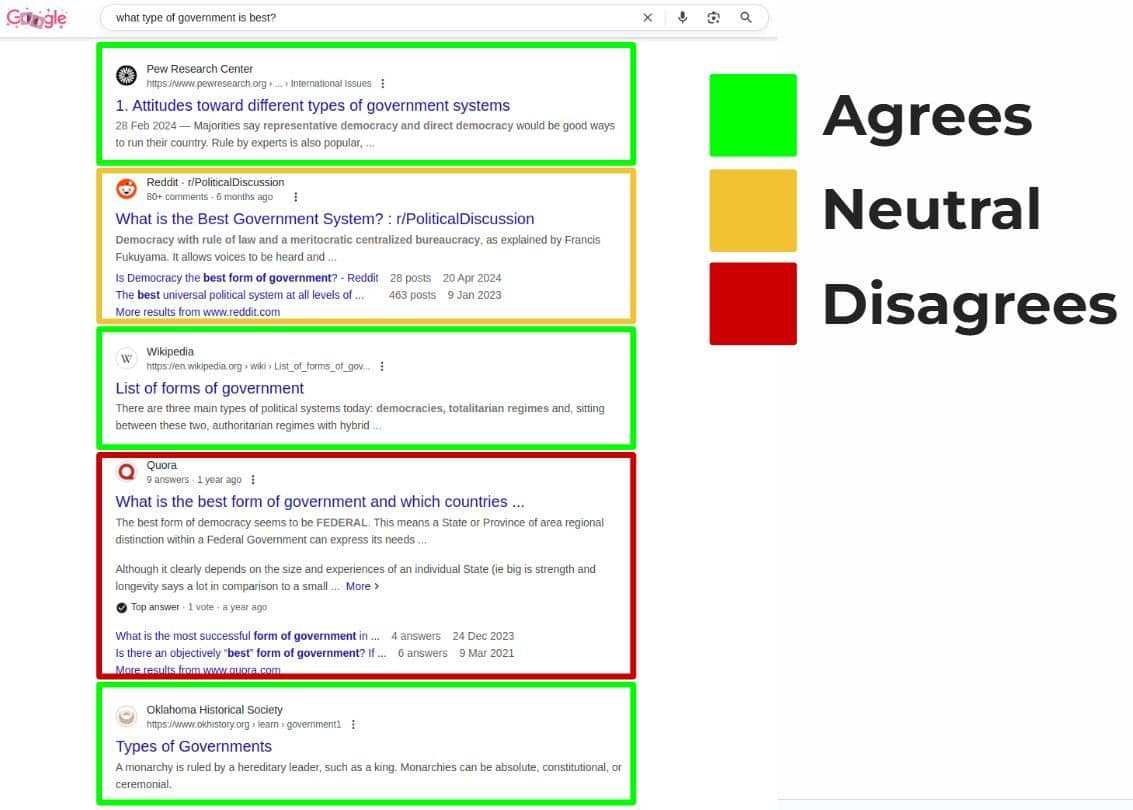
We must strive to be more than we are
There is a common misunderstanding that since Google tries to gauge "consensus", that you need to agree with the consensus to rank, not necessarily true! ⤵️
There are many search terms which don't have an objectively "correct" answer, and Google therefore may seek to get a mix of views. 🚦
This can actually be in some cases why you are not ranking. If you've produced "agree with consensus" content and your client is saying "why don't we rank, our content is better by every measure of what is in #2 and #4" - that may be true, but Google specifically wants neutral or disagreeing documents for that place. ☝️
It's not that your content is bad, it just doesn't fit the recipe of what they're trying to cook! 👨🍳
The nature of LLM training data means they are also very good tools to summarise whether a page goes with the consensus of other documents on the web.
|
Links are only broken...until they're not
Check your 404 URLs, and check them twice! This is a rare, but significant issue I've caught a few times with caching ⤵️
🖥️ As one of their standard pre-crawl checks, Sitebulb will request a "made up" URL to make sure the server respond correctly with a 404 Not Found HTTP Header. This is to ensure among other things, you don't generate lots of Soft 404s, or even worse, get these pages indexed.
🤖 A few times, including this year, I have encountered setups which can still generate this problem, but get past this initial 404 check. What I discovered was happening:
- A user requests a URL that does not exist, the server correctly responds with an HTTP/404 code, and shows the user a "Page Not Found" page.
- However, because of how the caching is setup on the server, it creates a cached version of the page it has just served.
- If the user (or anyone) requests that same 'broken' URL, the first thing the server does is check its cache for that page - and it exists! So it will return an HTTP/200 code and then show the user a "Page Not Found" page.
🔥 This could obviously lead to all kinds of other issues. So as standard, I will ping 404 URLs twice to make sure this isn't happening.
But you know what makes Sitebulb so great? I chatted to them about this, and it's on the roadmap to add it as a standard pre-crawl check. 😎
That's listening to your customers 👏
|
Refer subscribers and earn rewards!
|
|
|